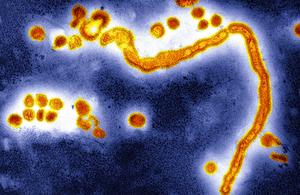Flu levels continue to rise
‘Catch it. Bin it. Kill it’ campaign relaunched in response to recent increase in influenza activity.

Seasonal flu
Latest figures from Public Health England (PHE) indicate that flu is continuing to circulate in the community.
Overall, levels are now higher than the peak of flu activity observed in the last 3 seasons, but have not reached the levels seen in the last notable seasons of 2010 to 2011 and 2008 to 2009. The number of patients hospitalised due to flu remains low at a rate of 1.99 per 100,000.
Once flu is spreading, apart from vaccination, hygiene is the main method that can help prevent spread, and the recent increase in activity has led to the relaunch of the annual ‘Catch it. Bin it. Kill it’ campaign, consisting of national press, radio, video-on-demand and digital advertising, to run for approximately 3 weeks.
Professor Nick Phin, head of the respiratory diseases department at PHE, said:
Through this campaign we are urging everyone to carry tissues and to use them to catch coughs or sneezes, to bin the used tissues as soon as possible and then to wash their hands and kill the germs.
Although unpleasant, for most healthy people, flu is a self-limiting illness. Symptoms include sudden onset of fever, cough as well as sore throat, aching muscles and joints. The best advice for treating flu in healthy people is to stay at home, rest, drink plenty of fluids and take appropriate pain relievers, such as paracetamol. Children under 16 should not take any medicines containing aspirin. People in at risk groups who develop symptoms consistent with flu, or if anyone’s symptoms persist or become more severe, they should seek medical advice.
Dr Richard Pebody, head of seasonal flu surveillance at PHE, added:
Prevention of the virus is an even better intervention, and it’s not too late for people in ‘at risk’ groups to get the vaccine for free as they are at much greater risk of becoming seriously unwell if they catch flu, and sadly many end up in hospital. This includes people with health conditions, even those that are well managed, such as asthma, diabetes, heart, lung, liver or renal diseases, those with weakened immune systems, as well as older people and pregnant women. Anyone in these groups who hasn’t yet had the vaccine should contact their GP.
Latest flu vaccine uptake figures from PHE show some positive signs, with more than 70% of people aged 65 and over vaccinated. However less than 50% of those aged under 65 with a health condition have been vaccinated, and only 43% of pregnant women. In addition, 37% of all 2 year olds, 40% of all 3 year olds, and 32 % of all 4 year olds have been vaccinated with the nasal spray vaccine as part of the childhood flu immunisation programme. PHE also encourages healthcare workers and carers who could pass the infection to vulnerable people to get vaccinated.
Dr Pebody added that those at greater risk from the virus should not be deterred from having the vaccine due to recent reports of a vaccine drift. He said:
Our Australian counterparts and those at the US Centres for Disease Control (CDC) reported differences between the vaccine strain for the (A/H3N2) virus and some circulating flu strains last year. This is called drift.
Recently, only 5 of 24 UK virus isolates tested by the PHE Respiratory Viruses Unit show reduced antigenic reactivity to the current vaccine virus, showing a proportion of flu viruses circulating in the UK are likely to be drifted. Further analysis will take place, but there is currently no evidence that the drift variant will become the dominant strain here, or that such a drift will result in reduced effectiveness of the 2014 to 2015 vaccine. Existing vaccine is likely to still provide some protection and getting vaccinated remains the best way to protect yourself from flu.
PHE will continue to monitor the epidemiological and virological situation closely. Influenza vaccine and antivirals for appropriate target groups remain key interventions to reduce the health impact of influenza.
In December, following PHE advice, the Chief Medical Officer (CMO) issued guidance to all GPs on the use of antiviral drugs for the management of people presenting with flu-like illness in England, who are at higher risk of developing complications. Antivirals can reduce the risk of severe illness, or even death, in patients who are in high risk groups or who are considerably unwell and hospitalised with influenza.
Notes to editors
- Read the latest flu report
- Read the CMO’s letter on the use of antivirals
- Public Health England exists to protect and improve the nation’s health and wellbeing, and reduce health inequalities. It does this through world-class science, knowledge and intelligence, advocacy, partnerships and the delivery of specialist public health services. PHE is an operationally autonomous executive agency of the Department of Health. Website: www.gov.uk/phe. Twitter: @PHE_uk, Facebook: www.facebook.com/PublicHealthEngland